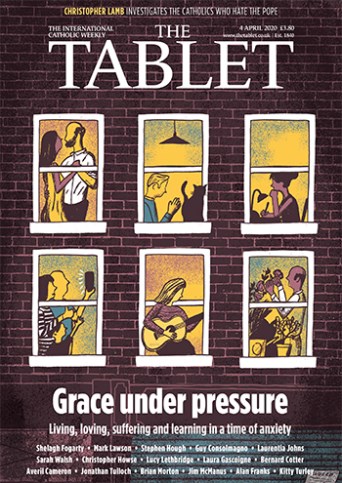Grace under pressure
It’s always frantic and noisy on press day, but over the last two weeks The Tablet has been created in a strange sort of silent frenzy, with all of us working from kitchen tables, spare bedrooms and garden sheds around London and beyond. As our leader points out this week, we are all rediscovering how interdependent life really is, how much we owe to public services, how heavily yet absent-mindedly we lean on our colleagues and neighbours, how precious are our family and friends and – in the case of a weekly news magazine – our readers. Thank you for your support and loyalty. We will continue to do everything we can to keep you up to date hour by hour with the latest news in the Catholic world via our website and to make sure the magazine keeps arriving through your letterbox every week.
In this week’s issue radio presenter Shelagh Fogarty, rural priest Bernard Cotter, pianist and composer Stephen Hough, NHS consultant Sarah Walsh, and impoverished part-time academic James Russell reflect on the resilience, kindness and agility with which so many people have been responding to the coronavirus pandemic.
Up to 100 million people died in the Spanish flu pandemic of 1918. The lesson Brian Morton takes from it is that faith, selflessness, empathy and courage as well as science are needed to defeat a virus. Bob Dylan has released his first original work in eight years – and he is, as Alan Franks reminds us, the perfect voice for the apocalypse. An exasperated Jonathan Tulloch writes that many of the scientists governments around the world turned to for help in dealing with the coronavirus are the same scientists whose warnings about the effects of climate change these same governments have blithely ignored – with what will be far more catastrophic consequences, unless similarly drastic action is taken.
Melanie McDonagh’s column last week provoked several Letters to the editor, some agreeing that closing all our churches, even for private prayer, was excessive, others feeling strongly that Catholics should muck in with the general requirement to avoid all unnecessary risks to the lives of others; we reproduce a small sample. Jim McManus, the professor of public health who advised the bishops to shut the churches, shares the pain but explains the rationale. Christopher Howse, who lives round the corner from Westminster Cathedral, likes the sounds of its bells ringing for the Angelus; he wonders if they might also ring the sacring bell for the main Mass – two double strokes from a small bell – as usual. After all, the cathedral might be shut, but the Mass still goes on.
Palm Sunday begins a very different Holy Week this year. In her Lenten meditation, Laurentia Johns of Stanbrook Abbey remembers Dietrich Bonhoeffer, who lived through the Triduum and Easter Week in 1945 preparing for his execution by the Nazis. And in an exclusive extract from his unputdownable forthcoming book chronicling Pope Francis’ battle to reform the Church, our Rome correspondent Christopher Lamb investigates why some of the richest Catholics in the United States are so bitterly opposed to this papacy.
In Books, Kitty Turley finds profound insights and unforeseen pleasures in Pauline Matarasso’s reflections on the Word made flesh; Carina Murphy rounds up three books offering advice for a happier, calmer and wiser life; Christopher Bray is unpersuaded by Tom Oliver’s combination of ecological science and Buddhism; Averil Cameron admires Candida Moss’ brief but rich and complex study of what the early Christians understood about the nature of survival in the afterlife; and James Moran is swept happily along by Maggie O’Farrell’s novel reimagining the Shakespeares’ marriage.
Theatre doors are bolted and chained. It’s happened before at times of war and plague, but Mark Lawson believes that Spring 2020 could come to be seen as the most devastating ever closure of the UK’s playhouses. Lucy Lethbridge loved a thrilling Netflix documentary about the origins of the disability rights movement; D.J. Taylor was gripped by a radio documentary about the ill-fated Apollo 13 mission; and, miserable without a gallery to go to, Laura Gascoigne wonders if the central place of suffering in its art might help explain Christianity’s powerful grip on the western imagination.
Seminaries have shut down too of course but, as Liz Dodd reports in seven pages of news from Britain and Ireland and across the world, formation continues through online teaching, spiritual direction and prayer groups. Jonathan Luxmoore reports on mixed responses in the Orthodox world to governments’ insistence on church closures, and Francis McDonagh reports that the Brazilian church has joined protests against President Bolsonaro’s attempt to play down the threat posed by Covid-19. Pope Francis is still meeting officials, which some think is unwise. In his View from Rome Christopher Lamb speculates on what would happen should the Pope resign or, God forbid, die during the crisis. It looks as if a Dubliner will be in charge. In an online exclusive, Chris interviews Vincent Nichols on his hopes and fears during this strange time, available to listen to in full on our podcasts page. The Cardinal believes that this time of suffering and hope could make the Church stronger.
If a loving God created the universe, why are there pandemics that sweep away the lives of the most vulnerable? It’s a question Guy Consolmagno is asked more than any other. His answer is simple and honest: “I don’t know”. In the Christian scheme of things, there is hope and compassion but always, in the end, mystery.
Wishing you and yours all good health.

Brendan Walsh
Editor of The Tablet
Get Instant Access
Subscribe today to take advantage of our introductory offers and enjoy 30 days' access for just £7.99
SUBSCRIBE NOW

